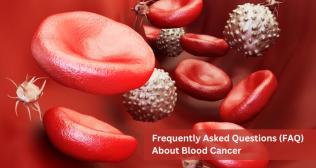
Understanding Platelet Count in Dengue Fever: What You Need to Know
Platelets are the tiny cells that help to stop bleeding. In dengue fever, platelet count is a very important indicator to monitor the severity of the disease, as in a dengue infection, the platelet count can fall drastically, leading to multiple complications. The dengue virus tends to have a significant impact on the bone marrow, which is where these platelets are produced, thus leading to a reduced production of these platelets in our body. Also, over a period of time, this virus might start invading our body cells causing the destruction of the already present platelets, thereby further reducing their count.
Importance of platelet count
In patients suffering from dengue fever, it is highly important to monitor the platelet count to analyse disease progression and treatment efficacy.
In cases of severe thrombocytopenia, it may be necessary to administer platelet transfusions or other treatments to prevent bleeding.
Monitoring platelet count can also predict clinical outcomes with steady increase usually indicating recovery and continued decline indicating worsening of the condition.
What is Dengue Fever and How Does It Affect Platelet Count?
Dengue fever is caused by mosquitoes, which are infected with a virus called Aedes aegypti. The symptoms typically emerge 4-10 days post infection, majority experience mild symptoms ranging from mild to moderate fever (104°F/40°C), nausea, vomiting, lethargy, headache, pain around eyes, joint pain, body ache, rash during dengue and recover within 1-2 weeks. In a few cases, the symptoms can be severe leading to persistent vomiting, fast breathing, bleeding gums or nose, fatigue, restlessness, blood in vomit or stool, feeling thirsty and tired, pale and cold skin.
Impact of dengue on platelet count
The most worrisome factor of dengue is its impact on platelet count. The dengue can significantly lower platelet count leading to the condition called thrombocytopenia. This occurs because viruses can intervein the coagulation cascade and destroy platelets during coagulation, by consuming or engulfing platelet through the activation of complementary systems. This complementary system produces phagocytic cells which consume activated platelets leading to their destruction.
In addition to platelet destruction, the virus also impairs the ability of the body to generate new platelets. As platelets are the main components to prevent bleeding in the body, when their levels become low excessive bleeding can occur which can be severe dengue fever complication.
Dengue and blood count monitoring are crucial for managing the condition. If one suspects having dengue fever, seek medical attention immediately. Regular blood tests can help track platelet levels, allowing doctors to intervene with appropriate treatment and potentially prevent serious complications.
Normal vs. Abnormal Platelet Counts in Dengue Fever
Platelet count is an important factor in dengue fever and monitoring its levels are crucial. In addition, understanding the differences between normal and abnormal platelet counts gives an idea of what to look for and when to get help.
Normal Platelet Count: Generally, a healthy adult will have between 150,000-450,000 platelets per microliter of blood. These minute cells play an essential role in blood clotting to stop bleeding.
Abnormal Platelet Count in Dengue: In dengue fever, the virus can damage platelets and cause platelet levels to drop. The drop can range from a mild decrease to a severe decrease, with counts sometimes falling below 100,000.
Importance of Low Platelets: When platelet counts are low, the chances of bleeding increase. Bleeding can occur as bruises, nosebleeds, gum bleeding, or, in some cases, internal bleeding, which can be fatal.
Table presenting the description of platelet count
What You Should Do: If you believe you have dengue, the first thing to do is consult a physician. They will check your platelet count and a few other things with a simple blood test. Detecting and treating early can help to better mitigate conditions with dengue and reduce these risks of major problems.
Managing Low Platelet Count During Dengue Fever
There is a considerable decrease in platelet count with dengue along with high temperature, therefore the condition has required to be managed meticulously. A reduction in platelet level can trigger a bleeding so preventative measures must be taken. Here is how can one manage low platelet count during dengue fever treatment:
Diet for low platelet count
Low platelet count can be managed by eating a balanced diet. The ideal would be to prioritize vitamin-rich foods like vitamin C, K, and folate, allowing them to increase the production of platelets. Examples include oranges, lemons, strawberries, and green leafy vegetables like spinach and fenugreek. Papaya leaf extract is also one of the most popular diets for low platelet count because it improves its production. Additionally, pomegranate and beetroot have a higher iron content, which helps in keeping red blood cells healthy.
Consume Plenty of Water and Get Enough Sleep:
Dengue fever treatment calls for the rest. The body requires power to fight the health problem as well as rest assists to save that power. Hydrate on your own with water, tender coconut water along with natural teas. Appropriate hydration helps with general recuperation and allows preserving regular blood quantity as well as various other physical liquids which is necessary when handling reduced platelet counts.
Consideration to Monitor Platelet Count Regularly:
It is required to keep track of platelet count on a regular basis. Speak with a physician for ideal examinations plus treatment options. In severe problems when the platelet counts are precariously reduced or dropping, an aggressive clinical therapies like blood transfusions might be needed as component of dengue fever treatment.
Do Not Take Blood-Thinning Medications:
Physician may suggest avoiding tablets such as aspirin because, during dengue fever, one has already suffered from a decreased platelet count, which could cause further decreases. Always consult your doctor before taking any medication.
Applying these health tips can help to manage low platelet count in dengue fever effectively and also have better recovery process. If diagnosed with dengue fever one has to consult treating doctor before changing the prescribed medication to ensure proper treatment. In addition to medical advice regular follow-up is recommended for adequate recovery.
A reduced platelet counts can be a major worry, particularly if it's gone along with by particular signs. Do not be reluctant to look for clinical focus if you experience any one of the symptoms as given in the below sections.
When to Seek Medical Help for Platelet Count Issues
One can start with over-the-counter medications, if the platelet count is normal, even if the individual has a high temperature. But a low platelet count, along with a high temperature, can be a serious concern. Don't hesitate to seek medical attention if you experience any of the following:
- Abrupt, unexplained bleeding. This can be an indication of a significant hidden problem.
- Nosebleeds that are regular or hard to stop.
- Heavy menstrual blood loss.
- Blood loss from gum tissues.
- Presence of blood in your pee or stools.
- Pinpoint red spots or bigger purple spots on your skin.
- Light-headedness, weakness or tiredness.
It's particularly crucial to look for urgent clinical care if you experience any one of these signs and symptoms, together with a high temperature, chills, or frustration, as these can be indications of dengue fever. If you are worried about your platelet count or think you could have dengue fever, do not wait to call your physician or look for immediate treatment. Early medical diagnosis and along with timely treatment, can enhance the possibilities of a complete recovery.
Preventive Measures and Tips to Avoid Dengue Fever
The condition of dengue fever is a serious and able to spread by mosquitoes to other people in home or office; hence, in order to stay healthy, it is important to prevent the illness transmitted by mosquitoes. Here are some tips that can help you prevent dengue fever and avoid low platelet counts and other complications as well.
Mosquito Control:
Dengue fever is mainly prevented through effective mosquito control. Begin by getting rid of mosquito breeding sites in and around your home. Empty, clean or cover any object that may hold water like flowerpots, buckets and tires, since mosquitoes lay their eggs in standing water. Moreover, you can consider using mosquito larvicides in water that cannot be drained. Mosquitoes can be prevented from entering your house by keeping doors and windows closed or using screens.
Personal Protective Measures:
It is important to note that wearing long sleeved clothing and pants will help reduce the risk of mosquito bites, especially during the peak hours when mosquitos are most active early in the morning or late in the afternoon. Further measures that can be taken to guard against mosquito bites include applying insect repellents that contain DEET, picaridin, or oil of lemon, neem, eucalyptus on exposed skin. One should sleep under mosquito nets, notably in dengue fever areas, for protection throughout the night.
Consume immunity boosters:
Consume food which stimulates immunity: Despite eating nutritious meals and maintaining hygiene the dengue can still get contracted especially in children as their immune systems are still developing, rendering them more susceptible to infection. Hence it is important to add ingredient in food that enhances immunity. Examples of immunity boosters are garlic, ginger, turmeric, green vegetables, almonds.
Community Efforts:
Participate in community mosquito control programs. Community-wide activities help to reduce mosquitoes and lower the risk of infection.
By following these tips to avoid dengue fever and implementing strong mosquito control measures, you can significantly reduce your risk and protect yourself and your family from this potentially dangerous illness. Prevention is key to overcoming the condition, and taking these measures can help you stay healthy and dengue-free.
Conclusion
Staying informed about dengue fever and effectively managing platelet count can help in recovery. Dengue fever is a case of drastic drop in platelet count, which at times may be life-threatening. The critical steps in managing the condition are monitoring platelet levels, keeping the body well hydrated, and timely seeking medical advice. One can prevent the situation from getting worse by being aware of the symptoms and seeking timely treatment. By empowering the knowledge, awareness and being well-informed on dengue fever and one can take a pre-emptive measure that could make all the difference in a speedy and full recovery.
Frequently Asked Questions (FAQs)
What does a normal platelet count in dengue?
A normal platelet count is generally between 150,000 and 450,000 per microliter of blood. In dengue, platelet counts can drop significantly, often below 100,000. This is known as thrombocytopenia and is a common complication of dengue fever.
How to manage platelet count during dengue fever?
Platelet count during dengue can be managed by taking adequate rest, staying hydrated with water or tender coconut, following the intake of medications prescribed by doctors. In addition, including fruits and vegetables that stimulate platelet productions such as papaya, broccoli, spinach.
Does low platelet count can be identified by symptoms?
Yes, low platelet count can be identified by symptoms such as nose bleeding, gum bleeding, presence of blood in urine or stool. Also, one may notice bruises on their body.
Should one consult doctor about platelet count in dengue?
It is important to seek medical consultation for any concerns on platelet count during dengue fever. As early diagnosis and treatment will make up speed recovery preventing from severe complications
How many times one should visit doctor if diagnosed with dengue?
The number of times you should visit a doctor for dengue depends on your individual situation and the severity of your case. It's crucial to consult with a medical professional for personalized guidance. They can assess symptoms, monitor progress, and determine the appropriate frequency of follow-up visits.
What test may be advised during dengue fever?
During dengue fever, certain blood test such as Complete Blood Count (CBC), Dengue NS1 Antigen Test, Dengue IgM Antibody Test, Dengue IgG Antibody Test can be advised.



















